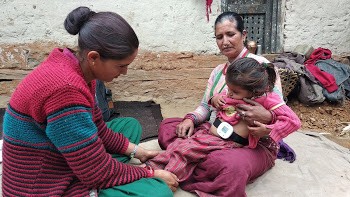Background
UNICEF’s Acute Respiratory Infection Diagnostic Aid (ARIDA) project was initiated as a response to the call for better pneumonia diagnostic aids and aims to identify and introduce automated Respiration rate (RR) counting aids for classifying fast breathing pneumonia, for use by frontline health workers in resource-limited community settings and health facilities. ChARM device was individually tested in the community to measure the RR in children under 5 years of ages, this decided used accelerometer based system, which automatically classifies breathing rate according to the Integrated Management of Childhood Illness (IMCI) guidelines. HERD International was contracted by UNICEF to generate evidence based data regarding acceptability of ARIDA ChARM device and its adherence to IMNCI algorithms, among FCHVs and health workers.
Objectives
- To determine if FCHVs using an ARIDA ChARM device adhere to IMNCI algorithms and correctly assess and classify children under-five with cough and/or difficult breathing.
- To document the user experience of ARIDA ChARM device in a sick child consultation.
- To explore the acceptability of the ARIDA ChARM device to FCHVs, HWs and caregivers.
Methodology
The study was a prospective, observational study with the use of both quantitative and qualitative methods. The quantitative approach had structured evaluations which was conducted among 132 trained FCHVs after the training using ChARM device on two phases. First evaluation was conducted on September/October 2018 and second evaluation was conducted after two months of routine use of the device on November/December 2018. For the Qualitative Approach Semi-Structure interviews were conducted with a sample of FCHVs., HWs and caregivers after second phase of quantitative observation. The study was conducted in a community setting in three palikas – Chandanath municipality, Tila rural municipality and Tatopani rural municipality of Jumla district in Karnali province of Nepal. Jumla district was selected because of the high burden of pneumonia, sufficient number of FCHVs with experience and availability, political stability and availability of oxygen at the district hospital.
Project focal person
This project’s focal person is Ms. Abriti Arjyal
Associated Team Members
Abriti Arjyal
Research Manager - Qualitative and Multidisciplinary ScienceAbriti Arjyal
Research Manager - Qualitative and Multidisciplinary ScienceKey Expertise Ms. Abriti Arjyal works as Research Manager – Multidisciplinary Qualitative Research – at HERD International and has experience in the area of public health, health system and service delivery research, social science and gender, and equity. She is an emerging young researcher with more than seven years of experience leading formative and operational field studies, evaluation studies, and literature reviews, with expertise in design and implementation of qualitative research, and various community and participatory based approaches. She has sound knowledge [...]
Learn moreProject Location
Similar Projects
Introduction Nepal is in the process of institutionalizing federalization. Three tires of government, as per the new structure, ...
A short term project to monitor the activities of UNICEF interventions in the earthquake-affected districts to help UNICEF perform ...
Reaching the unreached with family planning services … The UK Department for International Development (DFID) and the United States ...
Background Since 2003, MDA program has been conducting till date in Nepal. The program was initiated in all districts in 2013 and ...
Monitoring and Evaluation of Remote Areas Maternal and Newborn Health Pilot (RAMP), Taplejung This was a pilot project ...
Background TDR, the Special Programme for Research and Training in Tropical Diseases, hosted at the World Health Organization in ...


